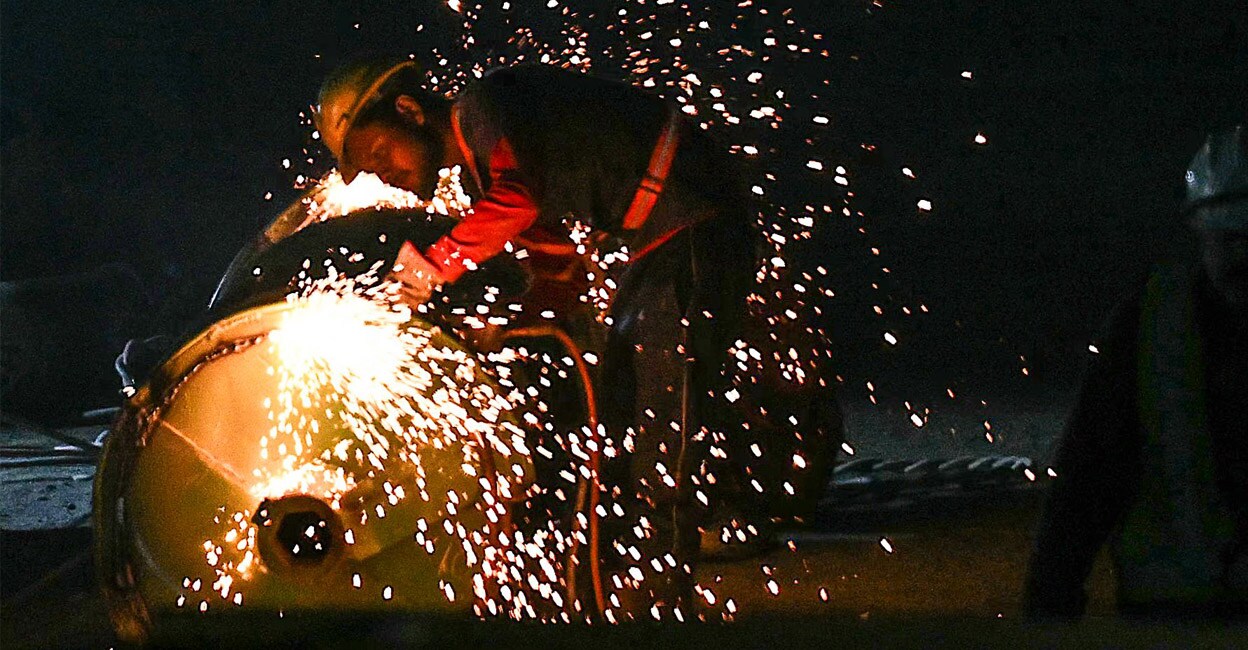Uttarakhand tunnel collapse: Horizontal boring operation resumes to rescue trapped workers

Mail This Article
Uttarkashi: As the first visuals of the 41 workers trapped inside the Silkyara tunnel in Uttarakhand emerged Tuesday, officials said they have resumed the stalled operation to evacuate them through an escape passage cutting across the debris.
A press release issued in the evening by the Union Ministry of Road Transport and Highways in Delhi said the NHIDCL has resumed the horizontal boring operation from the Silkyara end that involved an auger machine. At another press briefing in Silkyara a little later in the evening, it became clear that the actual drilling was set to begin later in the day.
Rescuers also set off two blasts at the Balkot-end of the under-construction tunnel on the Char Dham route, beginning the process of drilling another tunnel an alternative to the Silkyara-end option to evacuate workers trapped inside for nine days. But this approach could take up to 40 days. Forty-one labourers were trapped nine days back in the under-construction tunnel when a stretch collapsed on November 12, cutting off the workers beyond it.
The huge America-made auger machine boring through the debris had come across a hard boulder on Friday afternoon, triggering vibrations that forced rescuers to put the operation on hold due to safety concerns. However, rescue workers continued to prepare for other options including drilling from above the tunnel to reach the workers.
But on Tuesday, National Disaster Management Authority member Lt Gen (retd) Syed Ata Hasnain and Road Transport and Highways secretary Anurag Jain told reporters in Delhi that the focus was back on horizontal drilling. Jain said the work started in the morning in Silkyara, and if everything goes well it should be over in two or two and a half days.
At the disaster site in Uttarakhand's Uttarkashi district, a video clip captured by an endoscopic camera sent in through a new six-inch wide pipeline brought hope to relatives who are camping there for days. The pipeline was pushed late Monday through 53 metres of debris.
In the video released by the rescue agencies, the workers wearing yellow and white helmets are seen receiving food items sent to them through the pipeline and talking to each other. Officials watching them on a screen are heard giving instructions, asking them to clean the lens. The workers are told to come near the camera and use walkie-talkies, apparently sent down earlier.
The camera is then pulled back up so that water can be released under pressure to clean the pipeline. Relatives have talked earlier to the trapped workers through the four-inch compressor tube that already existed. Food items like dry fruit were also being sent through that thinner pipe.
But the new lifeline' has come as a morale booster. Communication is much better and larger quantities of food can now be sent in. "I talked to him this morning, Sunita Hembrum, whose brother-in-law Pradeep Kisku is among the trapped labourers, told PTI. She has come to Silkyara from Banka in Bihar.
Oranges have been supplied to them through the new food pipe. Efforts are also underway to send khichdi to them. He was fine," she said. "Earlier we had to shout to make ourselves audible but today his voice was clear."

According to officials, food items like dalia, khichdi, sliced apples and bananas can be sent in through the new pipeline. Also, mobile phones and chargers could also be sent to the workers. Prime Minister Narendra Modi spoke to CM Dhami on Tuesday, the second day in a row. The prime minister said it is our top priority to rescue all the workers safely," Dhami posted on social media.
In Delhi, NDMA member Lt General (retd) Hasnain said simultaneous efforts are being made on five fronts to save the workers. But he added that the focus is on horizontal drilling" as the rock formation at the site poses challenges to vertical drilling. Road Transport secretary Jain said under the current circumstances "vertical drilling is the second-best option.
In Silkyara, Mahmood Ahmed, additional secretary in the same ministry, said six-metre sections of 900-mm wide steel pipes had been pushed 22 metres through the debris before the work stalled. Now 800-mm pipes will be inserted, making the process easier. When the pipe reaches the 22-metre point, drilling will resume, he said. Progress from the 22-metre point to the 45-metre mark will be the most critical. If the drilling goes smoothly, it will take 30 to 40 hours, Mahmood said.
Tribhuwan Singh Pangti, who retired as the additional director general of the Geological Survey of India (GSI) told PTI that horizontal drilling was safer. He claimed that safety norms were ignored during the construction of the Silkyari tunnel. International tunnelling expert Arnold Dix, who is at the site, said vertical drilling demanded precision. While drilling from the top, even a small mistake could mean missing the tunnel, he said.
The second-best option involves drilling more than 80 metres vertically from above the tunnel to reach the two-kilometre built-up stretch where the workers are now confined. Some of the heavy machinery for the alternative approaches has reached the disaster site. A road has also been constructed to haul a 75-tonne machine up the hill.
A doctor who talked to the trapped workers through the new pipeline said some of them complained of a burning sensation while passing urine. Electrolyte powder packets, multivitamin tablets and anti-depressants are being sent to them, general physician P S Pokhriyal said.
Uttarkhand's Director General (Health) Vinita Shah also visited Silkyara to oversee arrangements for shifting the 41 workers after their evacuation to different hospitals in the district.

